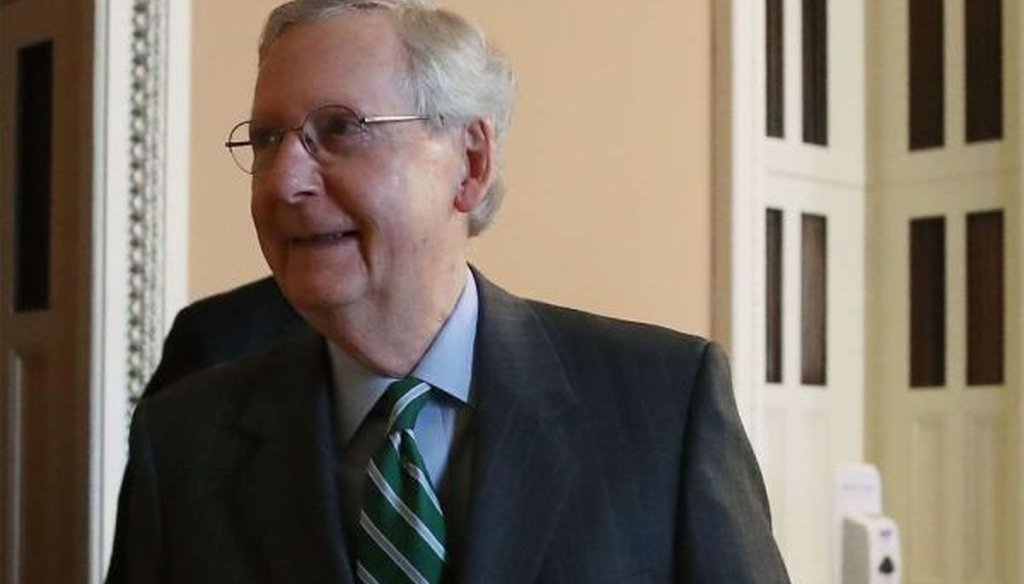Stand up for the facts!
Our only agenda is to publish the truth so you can be an informed participant in democracy.
We need your help.
I would like to contribute

Senate Majority Leader Mitch McConnell, R-Ky., leaves a closed meeting with Senate Republicans on June 22, 2017. (Mark Wilson/Getty Images)
U.S. Senate Majority Leader Mitch McConnell said that senators will confirm a successor for Justice Anthony Kennedy this fall, prompting Democrats to accuse him of being a hypocrite on election-year nominees.
"Our Republican colleagues in the Senate should follow the rule they set in 2016: Not to consider a Supreme Court justice in an election year," Senate Minority Leader Chuck Schumer said on the Senate floor, calling for McConnell to wait until voters have spoken. "Anything but that would be the absolute height of hypocrisy."
Other Democrats referred to it as the "McConnell standard" or the "McConnell rule"to wait until after the election. Democrats want to wait until after the election because they are hoping to regain the Senate which now has 51 Republicans and 49 Democrats.
But McConnell drew a distinction between vacancies during presidential election years and midterm election years.
Time for PolitiFact to weigh in on McConnell's statements.
Conservative Justice Antonin Scalia died on Feb. 13, 2016. About an hour after his death was confirmed, McConnell said the Senate shouldn’t confirm his replacement until after the election.
"The American people should have a voice in the selection of their next Supreme Court Justice. Therefore, this vacancy should not be filled until we have a new president," McConnell said.
McConnell went on to consistently oppose holding hearings on President Barack Obama’s nominee, Judge Merrick Garland.
"The American people may well elect a President who decides to nominate Judge Garland for Senate consideration. The next president may also nominate someone very different. Either way, our view is this: Give the people a voice in the filling of this vacancy," McConnell said in a Senate floor speech March 16, 2016.
A few days later on Fox News Sunday, McConnell said that Senate Republicans are "following a longstanding tradition of not filling vacancies on the Supreme Court in the middle of a presidential election year." We rated that statement False. Supreme Court nominations in presidential election years are rare, and there was no tradition of punting on confirmation.
In 2016, McConnell talked about the Senate’s power in an interview with Charlie Rose on PBS.
"What does advice and consent mean? I think the answer is whatever the Senate says it means at any given point. And we are in a period of senatorial assertiveness. And -- but even putting the assertiveness aside, it was never going to be possible to fill a vacancy in the middle of a presidential election year when you've got a president going out of office."
Republicans refused to allow Garland to go through the process. In January 2017, Trump nominated Judge Neil Gorsuch, who was confirmed by the Senate in April 2017.
Moments after Kennedy’s June 27 announcement, McConnell called for confirming a replacement within months.
"The Senate stands ready to fulfill its constitutional role by offering advice and consent on President Trump’s nominee to fill this vacancy," McConnell said on theSenate floor. "We will vote to confirm Justice Kennedy’s successor this fall."
The next day, McConnell delivered another floor speech in which he made a distinction between a presidential and nonpresidential election year.
"This is not 2016. These aren’t the final months of a second-term, constitutionally lame-duck presidency with a presidential election fast approaching. We are right in the middle of this president’s first term," McConnell said.
McConnell compared the Kennedy replacement to other Supreme Court confirmations in midterm years, including when Justice Elena Kagan was confirmed in 2010, Justice Stephen Breyer in 1994 and Justice David Souter in 1990.
"To my knowledge, nobody on either side has ever suggested before yesterday that the Senate should only process Supreme Court nominations in odd-numbered years," he said.
In April 2010, when Justice John Paul Stevens announced his retirement, McConnell didn’t call for a delay until after the election.
"As we await the President’s nominee to replace Justice Stevens at the end of his term, Americans can expect Senate Republicans to make a sustained and vigorous case for judicial restraint and the fundamental importance of an even-handed reading of the law," he said. (He ultimately opposed Obama’s nominee, Kagan.)
We asked McConnell’s spokesman Don Stewart about why McConnell wanted to hold off on Obama’s nominee until after the election in 2016 but wants to proceed this fall on a Trump nominee.
"You’ve answered your own question here: McConnell said Senate Republicans are ‘following a longstanding tradition of not filling vacancies on the Supreme Court in the middle of a presidential election year.’ This is not a presidential election year."
We interviewed a few experts about McConnell’s statements in 2016 and 2018 about confirmations.
Stephen Wermiel, an American University law professor, said that this is an example of political posturing.
"McConnell wants to distinguish between votes in presidential election years and votes in off-year congressional election years. I am not sure there is any principled basis for the distinction," he said. Wermiel added that it would be possible to argue that a presidential election is a more direct measure of the American people since the president selects the nominees.
Harvard law professor Mark Tushnet said that while talking about flip-flops and hypocrisy can sometimes be useful political rhetoric, situations always differ.
"The Democrats are right in saying that there's now a practice of not considering Supreme Court nominations in an election year, and Senator McConnell is right in saying that there's a practice of not considering such nominations in the final year as a second-term presidency. Which characterization wins out will depend on politics, not on ‘the facts’ of the cases."
Sarah Binder, a political scientist at George Washington University, said that in 2016 Republicans took the vacancy hostage to prevent Democrats from cementing a center-left majority on the Supreme Court.
"The move was cloaked in a made-up precedent," she said. "McConnell certainly emphasized the qualifier ‘presidential’ election year back in 2016, but the precedent was created to fit the circumstance. There's no general principle of ignoring presidential nominations to a Supreme Court in any type of election year."
Democratic leaders have portrayed McConnell as a hypocrite because in 2016 he wouldn’t hold hearings on Obama’s nominee but now wants to hold hearings to fill a vacancy under Trump .
Yes, both are vacancies during election years, but this comparison ignores the full context of what McConnell has said.
In 2016, McConnell repeatedly called for allowing the voters to choose the next president and then allowing the new president to nominate someone. McConnell didn’t call for delaying the confirmation for Kagan in 2010 during a midterm year.
However, Democrats have a point in that although McConnell qualified "presidential" election year in 2016, he is choosing to value voter input in a presidential year and not a midterm year. It’s not a coincidence that his choice to draw a distinction has a political backdrop: in 2016 he wanted to deny a Democrat a nomination whereas now he wants to give his own party that power.
Our Sources
CNN, "Democrats call out GOP 'hypocrisy' amid SCOTUS retirement announcement," June 27, 2018
Washington Post, "For the record: Supreme Court nominees considered in ‘election years,’" June 27, 2018
Washington Post, "Democrats' bogus argument about what the GOP said on election-year Supreme Court vacancies;" June 27, 2018
Sen. Mitch McConnell, "The American People Should Have a Voice in the Selection of the Next Supreme Court Justice," Feb. 22, 2016
Sen. Mitch McConnell, McConnell On Supreme Court Nomination, March 16, 2016
Sen. Mitch McConnell, McConnell Statement on Retirement of Justice Anthony Kennedy, June 27, 2018
Sen. Mitch McConnell Senate floor remarks, "President’s Nominee Should Be Considered Fairly," June 28, 2018
Sen. Mitch McConnell, Press releases after the 2010 and 2014 midterms
Politico, "McConnell throws down the gauntlet: No Scalia replacement under Obama," Feb. 13, 2016
Sen. Chuck Schumer, Floor remarks, June 27, 2018
Sen. Patrick Leahy press release, "REAX Of Senator Patrick Leahy On Justice Kennedy’s Announcement Of His Decision To Retire From The Supreme Court," June 27, 2018
Sen. Dianne Feinstein, Tweet, June 27, 2018
ABC This Week Transcript, "This Week' Transcript: Donald Trump, Reince Priebus, Denis McDonough, and Sen. Mitch McConnell," March 20, 2016
Snopes, "Supreme Court Flip-Flops," March 18, 2016
New York Times, "Democrats Cite McConnell’s Precedent to Delay Supreme Court Hearings. But Does It Apply?" June 22, 2018
PolitiFact, "Mitch McConnell exaggerates 'tradition' of not confirming election year Supreme Court nominees,"March 22, 2016
PolitiFact’s Trump-O-Meter, "Nominate someone from his list of justices to replace Antonin Scalia," Jan. 31, 2017
Interview, Don Stewart, U.S. Sen. Mitch McConnell spokesman, June 28, 2018
Interview, Sarah Binder, George Washington University political science professor, June 29, 2018
Interview, Norman Ornstein, American Enterprise Institute resident scholar, June 29, 2018
Interview, Mark Tushnet, Harvard constitutional law professor, June 29, 2018
Interview, Stephen Wermiel, Professor of Practice in Constitutional Law and part of the Program on Law and Government at American University Washington College of Law, June 29, 2018
































